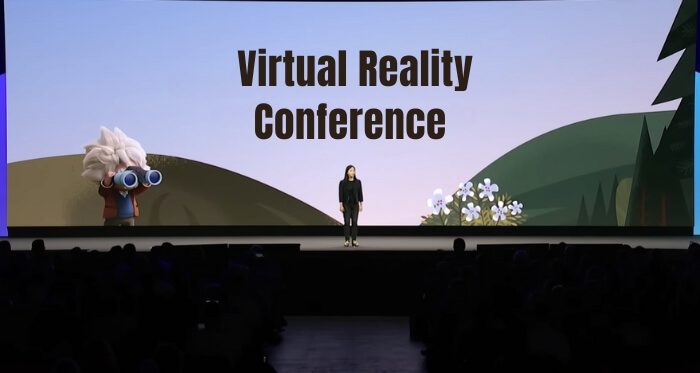Virtual reality (VR) has taken center stage in the rapidly evolving world of technology, revolutionizing various industries and captivating the interest of professionals worldwide. But as with most specialized events, there’s a price to participate. You might find yourself wondering, “How much does it cost to attend a virtual reality conference?”
The typical expense falls between $400 to $500. This range, while providing a general idea, might vary depending on the conference’s scale, duration, and the perks included.
Dive into this blog to understand the factors that influence these costs and to plan your next immersive VR experience better.
What Happens at a Virtual Reality Conference?
Virtual reality conferences are hubs of innovation, gathering tech enthusiasts, experts, and investors from around the globe. These events are a hotbed for knowledge exchange, showcasing emerging trends, and networking. They catalyze future technological advancements in the world of immersive reality.

At these conferences, participants immerse themselves in rich content sessions featuring talks from leading VR professionals. These discussions dive into advancements, practical applications, and the future trajectory of virtual reality.
VR’s infrastructure and security challenges can be better understood by attending cybersecurity and cloud engineering conferences. Interactive workshops often accompany these sessions, providing hands-on experiences with the latest VR technology.
In the exhibition area, where companies display their newest innovations. Attendees explore, experiencing firsthand the latest VR hardware and software. These showcases often become the talk of the tech world, highlighting breakthroughs and setting industry trends.
Different Types of Virtual Reality Conferences
Virtual reality (VR) has blossomed into a diverse and expansive field, influencing numerous industries worldwide. Reflecting this growth, a variety of VR conferences have emerged, catering to different sectors and interests. These events, distinct in their focus, unite participants under one common goal: deepening the understanding and application of VR technology.
Industry-Specific Conferences
Certain conferences focus exclusively on VR applications within a specific industry. These events bring professionals together, offering insights into VR’s industry-specific challenges and breakthroughs. Participants gain deep knowledge tailored to their professional domain, enhancing practical application.
Academic VR Conferences
These gatherings emphasize research, development, and scholarly discussion around VR. Experts, scholars, and students converge, sharing findings, theories, and innovations. This intellectual exchange propels the academic study and understanding of virtual reality forward.
Developer VR Conferences
Targeting creators in the field, these conferences emphasize skill enhancement and development tools. They feature advanced workshops, expert sessions, and collaborative opportunities. Developers leave equipped with deeper knowledge and practical skills, ready to innovate.
Consumer-Focused VR Expos
These vibrant expos are designed for the general public, showcasing the latest VR games, applications, and hardware. Attendees engage directly with VR, experiencing new releases and future products. It’s a playground where excitement and technology meet, igniting consumers’ passion for VR.
The landscape of virtual reality conferences is as varied as it is dynamic, offering unique angles and opportunities to different groups of attendees. Whether you’re a developer, an academic, a professional in a specific industry, or a passionate consumer, there’s an event crafted to meet your interests in the ever-expanding universe of VR.
How Much Does it Cost to Attend a Virtual Reality Conference?
Attending a virtual reality conference is an investment that professionals and enthusiasts are increasingly willing to make, given the rapid advancements and expanding opportunities in the VR realm.
However, the cost of participating in these events can vary based on several factors, making it essential to plan and budget accordingly.
Registration Fees
The most immediate cost associated with VR conferences is the registration fee. Depending on the event’s size, prestige, location, and included amenities, prices can range significantly. For a standard virtual reality conference, attendees can generally expect to invest between $400 and $500.
However, for high-profile events or those requiring specialized access, prices can escalate, reaching $1000 or more. Early-bird rate discounts for students, startups, or members of certain organizations can also affect registration costs.
Travel and Accommodation
For physical conferences, additional substantial expenses include travel and accommodation. These costs can vary widely based on the conference’s location, the distance the attendee must travel, and their preferences regarding comfort and convenience. It’s not uncommon for these expenses to exceed the registration cost itself, particularly for international attendees or those choosing to stay in high-end hotels.
Virtual Attendance
On the other hand, the advent of virtual attendance options, heightened by global circumstances like the COVID-19 pandemic, has introduced a more cost-effective avenue for participation.
Virtual attendance eliminates travel and accommodation costs and often comes with a reduced registration fee compared to in-person events. This option has made attending VR conferences more accessible to a global audience, though it offers a different experience than physical attendance.
Additional Expenses
Attendees should also consider additional expenses like meals, networking event fees, and local transportation. Moreover, those looking to exhibit or present may face extra costs associated with preparation materials, promotional items, or exhibition booth fees.
While the base cost to attend a virtual reality conference might range from $400 to $500, the total investment depends on various factors, including travel, accommodation, and additional opportunities for learning and networking. Potential attendees should consider all these aspects when budgeting for a conference to ensure a valuable and feasible experience.
Perks of Attending a Virtual Reality Conference
Virtual reality conferences are not merely events but pivotal gatherings that can significantly influence professional trajectories and industry trends. Understanding the perks of attending these conferences underscores their value beyond the financial and time investment involved.
Unparalleled Networking Opportunities
Conferences gather a diverse, passionate crowd, making networking a top perk. Attendees meet industry leaders, potential collaborators, and innovators, expanding professional networks. These interactions often lead to future opportunities, partnerships, or insightful exchanges.
Direct Access to Industry Innovations
Being on-site allows firsthand experience with the latest VR technology. Participants engage with new tools, applications, and breakthrough hardware, staying ahead in knowledge. This direct interaction informs and inspires attendees, shaping their future projects or investments.
Learning from the Pioneers
Keynote speeches and breakout sessions provide deep insights into evolving VR landscapes. Industry pioneers share experiences, trends, and predictions, offering attendees a competitive advantage. This knowledge transfer is invaluable, often sparking new ideas and strategies among participants.
Showcasing and Feedback Opportunities
For developers and companies, conferences are stages for showcasing innovations. Presenting work to a knowledgeable, engaged audience garners immediate feedback and perspectives. This interaction not only validates concepts but also guides and refines future development efforts.
Catalyst for Professional Growth
Beyond immediate gains, conferences influence long-term professional growth. They immerse attendees in high-energy environments, surrounded by ambition, innovation, and vision. This atmosphere reignites passion, commitment, and direction in one’s career, often leading to transformative professional decisions.
By embracing these opportunities, attendees are not just observing the industry but actively contributing to its shape and trajectory.
Are Virtual Reality Conferences Worth the Expense?
Virtual reality conferences represent a significant intersection between innovation and market trends, offering attendees a unique blend of learning and opportunity.
However, like any investment, it’s critical to weigh the pros and cons before committing resources. Understanding the benefits and potential drawbacks ensures an informed decision based on individual professional needs and expectations.
Pros
- Access to cutting-edge VR developments, providing insight into emerging technologies.
- Networking with industry leaders, opening doors to potential collaborations.
- Hands-on experience with the latest VR tools and applications, enhancing practical understanding.
- Exposure to new market trends through sessions and demonstrations, aiding strategic planning.
- Opportunity to receive direct feedback on projects or concepts from peers and experts.
- Professional development through workshops and seminars, boosting skill sets.
- Immersion in a motivational environment, reigniting passion and inspiration for personal endeavors.
Cons
- High costs associated with attendance, including registration, travel, and accommodation.
- Time commitment can be significant, especially for international events or multiple-day conferences.
- Overwhelming variety of content and activities, potentially leading to a lack of focus or burnout.
While there are drawbacks to consider, primarily concerning costs and time, the potential for career growth, inspiration, and direct engagement with the forefront of VR innovation often outweigh the cons for many attendees. Evaluating these factors in the context of one’s professional journey is key to determining the value of these events.
Bottom Lines
Virtual reality conferences stand as pillars of knowledge and networking in this domain. They offer a blend of professional growth opportunities, hands-on experiences with the latest innovations, and insights into the future of VR.
While the financial aspect is a consideration, with costs typically ranging from $400 to $500, the value derived often surpasses this investment.
So, when pondering, “How much does it cost to attend a virtual reality conference?” it’s crucial to factor in both the monetary expense and the invaluable benefits. Ultimately, these conferences serve as gateways to a brighter, more immersive future in the realm of VR.







